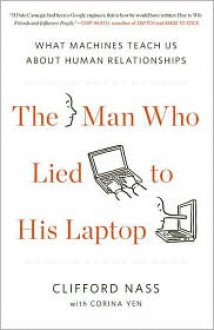The Man Who Lied to His Laptop: What Machines Teach Us About Human Relationships
by:
Clifford Nass (author)
Corina Yen (author)
Counterintuitive insights about building successful relationships- based on research into human-computer interaction. Books like Predictably Irrational and Sway have revolutionized how we view human behavior. Now, Stanford professor Clifford Nass has discovered a set of rules for effective human...
show more
Counterintuitive insights about building successful relationships- based on research into human-computer interaction. Books like Predictably Irrational and Sway have revolutionized how we view human behavior. Now, Stanford professor Clifford Nass has discovered a set of rules for effective human relationships, drawn from an unlikely source: his study of our interactions with computers.Based on his decades of research, Nass demonstrates that-although we might deny it-we treat computers and other devices like people: we empathize with them, argue with them, form bonds with them. We even lie to them to protect their feelings.This fundamental revelation has led to groundbreaking research on how people should behave with one another. Nass's research shows that: Mixing criticism and praise is a wildly ineffective method of evaluation Flattery works-even when the recipient knows it's fake Introverts and extroverts are each best at selling to one of their own Nass's discoveries provide nothing less than a new blueprint for successful human relationships.
show less
Format: hardcover
ISBN:
9781617230011 (1617230014)
Publish date: September 2nd 2010
Publisher: Current Hardcover
Pages no: 224
Edition language: English

The (natural?) urge to murder those automated voices is what this book is all about. By the way, if you swear at them, or repeatedly say, "I WANT TO TALK TO A HUMAN," they usually put you through to a person. Eventually. ~~Moved from GR~~ The Man Who Lied to His Laptop by Clifford Nass This b...

I was hoping that the book would cover how machines can teach us about human relationships...like the title said. Instead it was just another book that vaguely covers personality types and a bunch of common sense situations that are IRL...where do the machines come in?






 11 years ago
11 years ago




 14 years ago
14 years ago